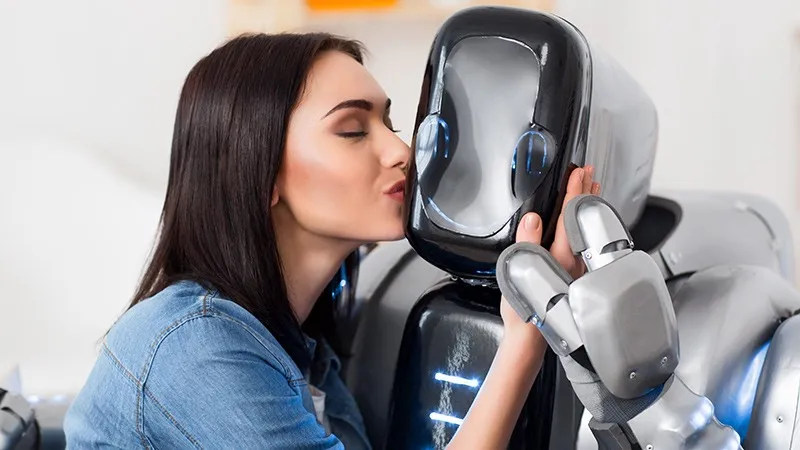Is our relationship with machines bending towards convergence?
From competition to collaboration to convergence, the trajectory of the relationship between humans and AI appears predestined and foreseeable.

The long arc of our relationship with machines is bending towards convergence.
By now you have already heard or read. Last month was awash with news of a new bogeyman named artificial intelligence, or AI. Recent layoffs, of less than 2% of the workforce, in India’s bellwether IT sector have opened the floodgates of anxiety. For some years now, a worry-laden global narrative about AI-induced job displacements has been brewing. Its unfolding script can undermine what college-educated knowledge professionals consider an inalienable right; trading the intelligent output of our minds in exchange for a good lifestyle. The fear is rising — if machines can do our work smarter and faster and cheaper — who will need us?
The first narrative that a tidal wave of AI bots is imminent, and it will destroy many current livelihoods, does have its passionate proponents. In this version of the story, humans and AI are competing for the same work.
In his book The Rise of the Robots, writer Martin Ford presents a vision of the future where the economy is strong, unemployment is the norm, and government pays a living wage to its citizens. In a mind-bending YouTube video Humans Need Not Apply, futurist CGP Grey illustrates how 70 million transportation sector jobs around the world will be at risk when self-driving cars hit the roads with lower operating costs and superior safety records. If our IT sector is experiencing some pain, spare a prayer for those in the transportation sector.
Fortunately, our evolving relationship with AI has a second narrative that is a lot more optimistic. In this storyline, AI is our active collaborator and trusted ally, shaping and saving our lives by filling critical gaps in our skills, knowledge, and experience. This benign persona of AI appeals to the consumer within each of us. For example, when our surgeon tells us that she plans to take help from Da Vinci, a surgical robot, to carry out an ultra-precise and painless operation upon our body, we don’t feel threatened by the idea of automation. Instead, we applaud her surgical skills and praise her ability to reduce our pain and suffering via automation.
There are plenty of similar examples where cobots, or collaborative bots, work in tandem with human experts to deliver excellent results. In 2016, during the course of a terrorist attack in Dallas, police deployed a first-of-a-kind police bot named MARCbot to physically approach the suspected terrorist and kill him with a bomb. Media and citizens alike raised a toast. In early 2017, my team launched Tia, a teaching bot that boosts the career prospects of fresh college graduates. Tia works with expert instructors to generate individualized study plans for thousands of job seekers per week. She will generate one million unique study plans within a short timeframe.
There is also a third narrative with regard to our complex relationship with AI, and it takes us into uncharted waters. How up close and personal can things get? Will machines become our social companions? Can they become life companions? Will the definition of family expand to include AI? These are radical questions, but they must be asked and answered.
Consider the case of ElliQ. It is a social companion bot that combats loneliness among senior citizens by keeping them physically active, mentally engaged and socially connected. After teaching itself the preferences of its owner, ElliQ can engage in contextual and meaningful conversation, read out stories and news, set up video calls with friends and family, schedule walks and activities, and even play games with the owner. How is this bot any less than a family member?
What lies beyond social companionship? In an interview with Scientific American, computer scientist David Levy makes the case that love and marriage with robots will be both legal and common by 2050. Ex Machina, an Academy Award winning science fiction thriller, makes the same point. It explores the story of Ava, an intelligent, humanoid robot caught up in a love-hate relationship with a human programmer. And if all that is not enough to make our heads spin, consider what Elon Musk has recently said. The revered tech prophet of our generation has gone on record that with the advent of deep AI, the human species will have no future unless we elect to merge ourselves with machines. In effect, carbon must converge with silicon. If you can’t beat them, join them.
Rudyard Kipling had famously said, speaking of the East and the West; never the twain shall meet. If he had witnessed firsthand the complex matters of Machines and Men, and decided to proclaim upon this realm, he probably would have said the exact opposite. From competition to collaboration to convergence, the trajectory of the relationship between humans and AI appears predestined and foreseeable. Ever the twain shall meet.
(Disclaimer: The views and opinions expressed in this article are those of the author and do not necessarily reflect the views of YourStory.)







